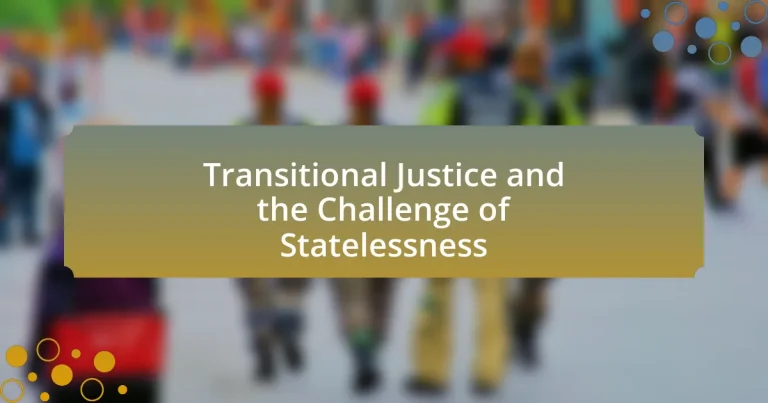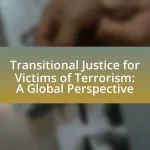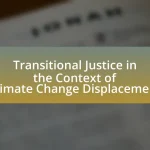Transitional justice encompasses judicial and non-judicial measures aimed at addressing human rights abuses and fostering accountability and reconciliation in societies emerging from conflict or authoritarian regimes. This article explores the intersection of transitional justice and statelessness, highlighting how stateless individuals often experience systemic human rights violations and are frequently excluded from justice processes. Key principles of transitional justice, such as accountability, truth-seeking, and reparations, are essential for restoring rights to stateless individuals. The article further examines historical contexts contributing to statelessness, the role of international laws, and the challenges faced by stateless populations in accessing justice. It also discusses effective strategies and best practices for integrating stateless individuals into transitional justice frameworks, emphasizing the importance of community engagement and collaboration among stakeholders to create sustainable solutions.
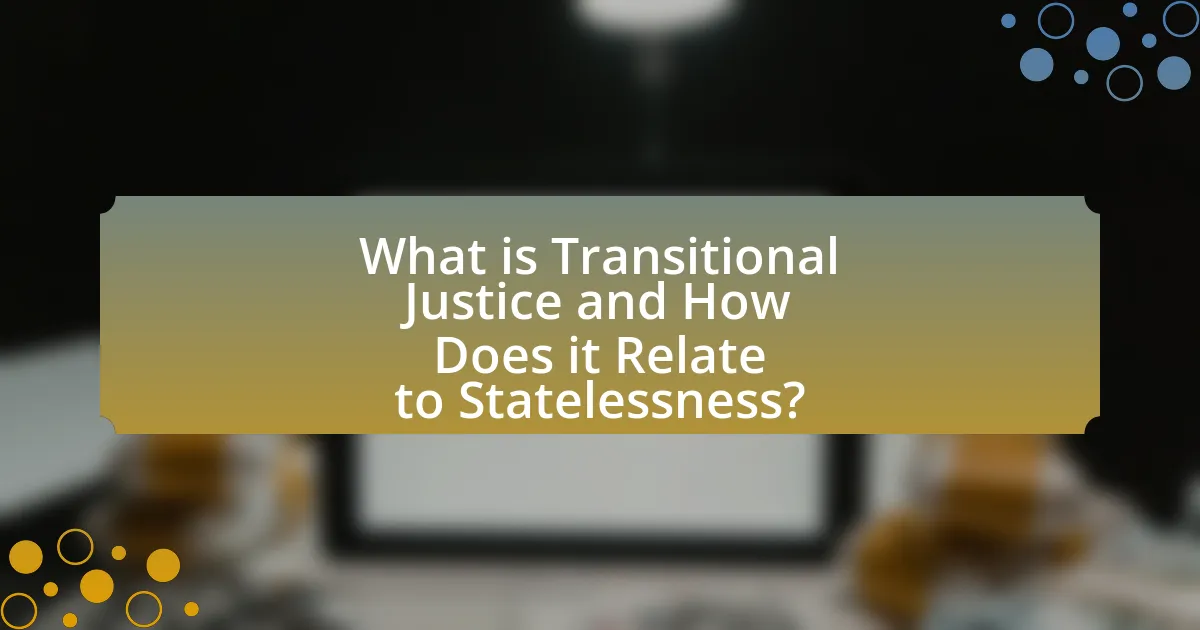
What is Transitional Justice and How Does it Relate to Statelessness?
Transitional justice refers to the set of judicial and non-judicial measures implemented to address legacies of human rights abuses and promote accountability, reconciliation, and the restoration of dignity in societies transitioning from conflict or authoritarian rule. It relates to statelessness as individuals who are stateless often face systemic human rights violations, including lack of access to justice, which transitional justice mechanisms aim to rectify. For instance, stateless individuals may be excluded from legal processes that seek to address past injustices, thereby perpetuating cycles of marginalization and abuse. Addressing statelessness within transitional justice frameworks is essential for ensuring that all victims receive recognition and redress, as highlighted in the UN’s 2016 report on the role of transitional justice in addressing the needs of marginalized groups.
Why is Transitional Justice Important in Addressing Statelessness?
Transitional justice is important in addressing statelessness because it provides mechanisms for accountability, redress, and recognition of rights for individuals who have been marginalized or excluded from citizenship. These mechanisms, such as truth commissions and reparations, help to restore dignity and legal status to stateless individuals, facilitating their reintegration into society. For instance, the UN High Commissioner for Refugees emphasizes that transitional justice processes can address the root causes of statelessness by acknowledging historical injustices and ensuring that affected populations are included in the political and legal frameworks of their countries. This approach not only aids in resolving individual cases of statelessness but also promotes broader societal healing and stability.
What are the key principles of Transitional Justice?
The key principles of Transitional Justice include accountability, truth-seeking, reparations, and institutional reform. Accountability ensures that perpetrators of human rights violations are held responsible, which is essential for restoring trust in the rule of law. Truth-seeking involves uncovering the facts about past abuses, often through truth commissions, to acknowledge victims’ experiences and promote healing. Reparations provide compensation and recognition to victims, addressing the harm suffered and facilitating their reintegration into society. Institutional reform focuses on transforming state institutions to prevent future violations, ensuring that justice systems are fair and effective. These principles are supported by various international frameworks, such as the United Nations’ Basic Principles and Guidelines on the Right to a Remedy and Reparation for Victims.
How does Transitional Justice aim to restore rights to stateless individuals?
Transitional Justice aims to restore rights to stateless individuals by implementing legal frameworks and policies that recognize and affirm their citizenship rights. This approach often includes mechanisms such as truth commissions, reparations, and legal reforms that address the historical injustices faced by stateless populations. For instance, countries emerging from conflict may adopt new laws that grant citizenship to individuals who were previously denied it, thereby rectifying past discrimination. Additionally, Transitional Justice processes can facilitate access to documentation and legal recognition, which are essential for stateless individuals to reclaim their rights and integrate into society.
What are the Historical Contexts of Statelessness in Transitional Justice?
Statelessness in transitional justice arises from historical contexts such as colonialism, state formation, and conflict. Colonial powers often created arbitrary borders and imposed citizenship laws that excluded certain groups, leading to statelessness. For example, the dissolution of empires after World War I and II resulted in new nation-states that did not recognize the citizenship of various ethnic minorities, leaving them stateless. Additionally, post-conflict scenarios frequently see individuals stripped of citizenship due to political purges or ethnic cleansing, as seen in the former Yugoslavia during the 1990s. These historical events illustrate how the legacies of colonialism and conflict contribute to the ongoing challenges of statelessness in transitional justice frameworks.
How have past conflicts contributed to the issue of statelessness?
Past conflicts have significantly contributed to the issue of statelessness by displacing populations and altering national boundaries, leading to the loss of citizenship for many individuals. For instance, the breakup of Yugoslavia in the 1990s resulted in numerous ethnic groups being rendered stateless as new states emerged and citizenship laws were redefined, often excluding those who were not part of the dominant ethnic group. Additionally, conflicts such as the Rwandan Genocide in 1994 led to mass displacement and the subsequent denial of citizenship to those who fled, further exacerbating the statelessness crisis. These historical events illustrate how conflicts disrupt legal frameworks and create conditions where individuals are left without recognized nationality, making them vulnerable to human rights abuses and limiting their access to essential services.
What role do international laws play in addressing statelessness during transitions?
International laws play a crucial role in addressing statelessness during transitions by establishing frameworks that protect the rights of individuals and promote their access to nationality. These laws, including the 1961 Convention on the Reduction of Statelessness and the 1954 Convention Relating to the Status of Stateless Persons, provide guidelines for states to prevent and reduce statelessness, particularly in contexts of political change or conflict. For instance, the conventions obligate states to grant nationality to individuals born on their territory and to ensure that laws do not arbitrarily deprive individuals of their nationality. This legal framework is essential during transitions, as it helps to safeguard the rights of vulnerable populations, ensuring they are not left without legal identity or protection amidst instability.
What Challenges Does Statelessness Present in Transitional Justice Processes?
Statelessness presents significant challenges in transitional justice processes by hindering access to legal recognition and rights for individuals affected by conflict or repression. Without citizenship, stateless individuals often lack the legal standing necessary to participate in justice mechanisms, such as truth commissions or reparations programs. This exclusion can perpetuate cycles of injustice and marginalization, as seen in cases where stateless populations, like the Rohingya in Myanmar, are denied basic rights and protections, complicating efforts to address historical grievances and promote accountability. Furthermore, the absence of a recognized legal status can obstruct the collection of evidence and testimonies, as stateless individuals may fear repercussions for engaging with transitional justice initiatives.
How does the lack of legal identity affect access to justice?
The lack of legal identity significantly impairs access to justice by preventing individuals from asserting their rights within legal systems. Without legal identity, individuals often cannot obtain essential documents such as birth certificates or national identification cards, which are necessary to access legal services, file complaints, or participate in judicial processes. For instance, a study by the World Bank indicates that approximately 1.1 billion people globally lack legal identity, which directly correlates with their inability to access justice systems effectively. This lack of recognition can lead to increased vulnerability to exploitation, discrimination, and denial of basic rights, further entrenching cycles of injustice and marginalization.
What barriers do stateless individuals face in participating in Transitional Justice mechanisms?
Stateless individuals face significant barriers in participating in Transitional Justice mechanisms, primarily due to their lack of legal recognition and protection. This absence of citizenship often results in limited access to legal processes, as many Transitional Justice mechanisms require individuals to have a recognized legal status to engage with them. Furthermore, stateless individuals may experience social and economic marginalization, which can hinder their ability to seek justice or participate in hearings. For instance, the UN High Commissioner for Refugees reports that stateless persons often lack documentation, making it difficult to prove their identity or claim rights, thereby excluding them from justice initiatives. Additionally, the fear of persecution or discrimination can deter stateless individuals from coming forward to participate in these mechanisms, as they may worry about potential repercussions from authorities or communities.
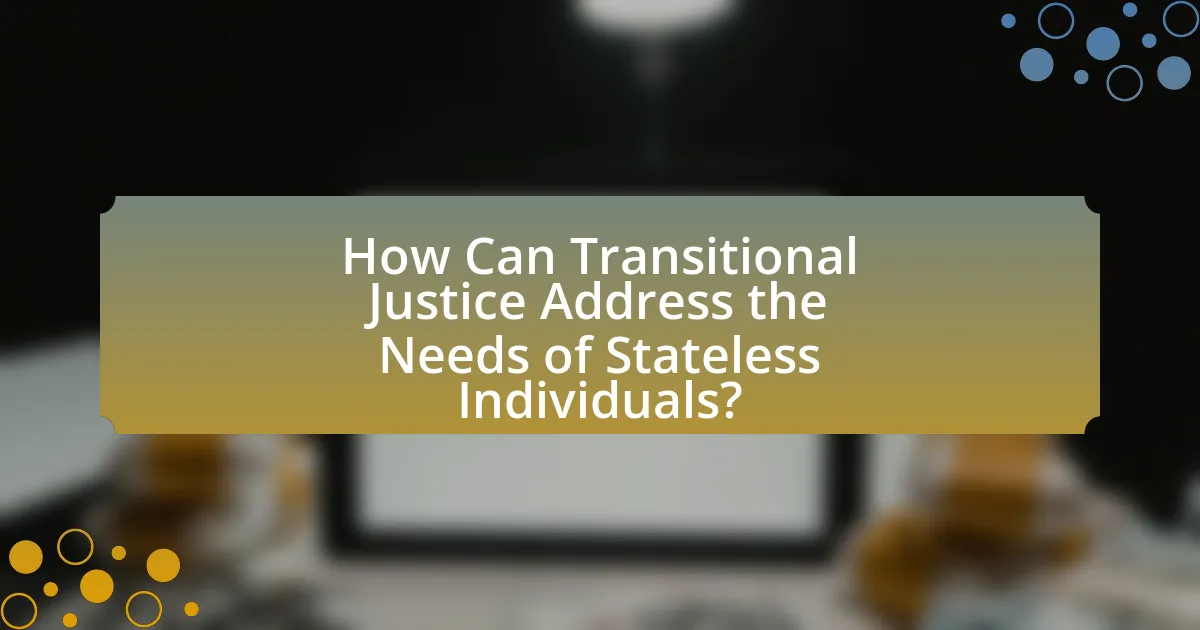
How Can Transitional Justice Address the Needs of Stateless Individuals?
Transitional justice can address the needs of stateless individuals by implementing legal frameworks that recognize their rights and provide pathways to citizenship. These frameworks can include measures such as truth commissions, reparations, and legal recognition of identity, which are essential for restoring dignity and ensuring access to basic services. For instance, the United Nations High Commissioner for Refugees (UNHCR) emphasizes the importance of legal identity for stateless individuals, as it enables them to access education, healthcare, and employment opportunities. By integrating stateless individuals into transitional justice processes, states can promote accountability and inclusion, ultimately fostering social cohesion and stability in post-conflict societies.
What Strategies are Effective in Combating Statelessness through Transitional Justice?
Effective strategies in combating statelessness through transitional justice include legal recognition, inclusive citizenship policies, and reparative measures. Legal recognition involves establishing frameworks that acknowledge the rights of stateless individuals, ensuring they can access legal documentation and services. Inclusive citizenship policies aim to provide pathways for stateless individuals to acquire citizenship, often through naturalization processes that consider their unique circumstances. Reparative measures, such as compensation and restitution, address historical injustices that contributed to statelessness, fostering social cohesion and integration. These strategies are supported by international frameworks, such as the UN Convention on the Reduction of Statelessness, which emphasizes the importance of legal identity and citizenship rights in promoting justice and stability.
How can truth commissions incorporate the voices of stateless individuals?
Truth commissions can incorporate the voices of stateless individuals by actively engaging them in the commission’s processes through outreach initiatives and inclusive participation strategies. This can be achieved by establishing mechanisms that allow stateless individuals to share their experiences and testimonies, such as community hearings, written submissions, and digital platforms that ensure accessibility. For instance, the International Commission on Missing Persons has successfully included marginalized groups by creating safe spaces for dialogue, which highlights the importance of tailored approaches that consider the unique challenges faced by stateless individuals. Additionally, incorporating legal frameworks that recognize the rights of stateless persons can enhance their representation and ensure their narratives are documented and acknowledged in the truth commission’s findings.
What reparative measures can be implemented for stateless populations?
Reparative measures for stateless populations include legal recognition, access to citizenship, and provision of basic rights and services. Legal recognition involves states acknowledging the existence and rights of stateless individuals, which can lead to pathways for citizenship. Access to citizenship is crucial, as it allows individuals to participate fully in society, including voting and employment opportunities. Provision of basic rights and services, such as healthcare, education, and social security, ensures that stateless individuals can lead dignified lives. According to the UNHCR, over 4.2 million people are stateless globally, highlighting the urgent need for these measures to address their vulnerabilities and promote their integration into society.
What Role Do International Organizations Play in Supporting Transitional Justice for Stateless Individuals?
International organizations play a crucial role in supporting transitional justice for stateless individuals by providing legal frameworks, resources, and advocacy. These organizations, such as the United Nations High Commissioner for Refugees (UNHCR) and the International Criminal Court (ICC), work to establish accountability for human rights violations and promote the rights of stateless persons. For instance, the UNHCR has developed guidelines that emphasize the importance of including stateless individuals in transitional justice processes, ensuring their voices are heard and their rights are recognized. Additionally, international organizations facilitate capacity-building initiatives for local governments and civil society, enabling them to address the specific needs of stateless populations effectively. This support is essential in creating inclusive justice mechanisms that acknowledge the unique challenges faced by stateless individuals, thereby reinforcing their access to justice and reparations.
How do organizations like the UN address statelessness in their Transitional Justice frameworks?
Organizations like the UN address statelessness in their Transitional Justice frameworks by integrating the rights of stateless individuals into their policies and programs. The UN High Commissioner for Refugees (UNHCR) emphasizes the importance of legal identity and citizenship as fundamental rights, advocating for the inclusion of stateless persons in transitional justice processes. For instance, the UN’s Guiding Principles on Internal Displacement highlight the need for states to ensure that displaced individuals, including the stateless, have access to justice and remedies for violations of their rights. Additionally, the UN has established specific initiatives, such as the Global Action Plan to End Statelessness 2014-2024, which aims to resolve existing cases of statelessness and prevent new occurrences, thereby reinforcing the connection between transitional justice and the protection of stateless individuals.
What partnerships are essential for effective Transitional Justice initiatives?
Effective Transitional Justice initiatives require partnerships among governments, civil society organizations, international organizations, and local communities. These partnerships are essential because they facilitate collaboration, resource sharing, and the integration of diverse perspectives, which enhance the legitimacy and effectiveness of justice processes. For instance, the United Nations has emphasized the importance of multi-stakeholder engagement in its guidelines on transitional justice, highlighting that inclusive approaches lead to more sustainable outcomes. Additionally, successful cases, such as South Africa’s Truth and Reconciliation Commission, demonstrate how partnerships between state actors and civil society can foster reconciliation and healing in post-conflict societies.
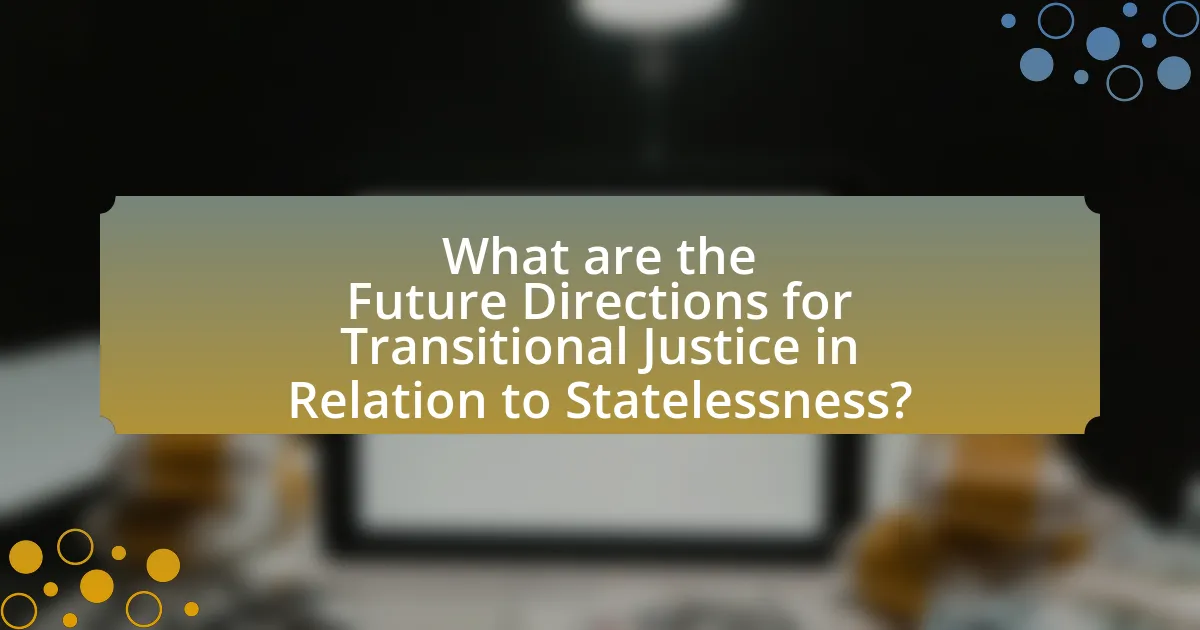
What are the Future Directions for Transitional Justice in Relation to Statelessness?
Future directions for transitional justice in relation to statelessness include the integration of legal frameworks that recognize the rights of stateless individuals, the establishment of mechanisms for accountability and reparations, and the promotion of inclusive citizenship policies. These approaches aim to address the historical injustices faced by stateless populations and ensure their participation in transitional processes. For instance, the UN High Commissioner for Refugees emphasizes the need for states to adopt laws that prevent statelessness and provide pathways to citizenship, which is crucial for the social and political inclusion of these individuals. Additionally, transitional justice initiatives can incorporate the voices of stateless persons to ensure their experiences and needs are adequately represented, fostering a more comprehensive and equitable approach to justice.
How can Transitional Justice evolve to better address statelessness?
Transitional Justice can evolve to better address statelessness by integrating legal frameworks that recognize and protect the rights of stateless individuals. This evolution can include the establishment of specific mechanisms within transitional justice processes that focus on the identification, documentation, and regularization of stateless persons’ legal status. For instance, the UN High Commissioner for Refugees (UNHCR) emphasizes the importance of ensuring access to nationality as a fundamental human right, which can be incorporated into transitional justice frameworks to provide pathways for citizenship and legal recognition. Additionally, transitional justice can incorporate community-based approaches that engage stateless individuals in the decision-making processes, ensuring their voices are heard and their needs are addressed. This approach aligns with the principles of restorative justice, which seeks to repair harm and promote inclusion, thereby enhancing the effectiveness of transitional justice in addressing the complexities of statelessness.
What innovations in policy could improve outcomes for stateless individuals?
Innovations in policy that could improve outcomes for stateless individuals include the establishment of universal birth registration systems and the implementation of legal pathways to citizenship. Universal birth registration ensures that all individuals, regardless of their parents’ nationality, are documented at birth, which is crucial for preventing statelessness. According to the United Nations High Commissioner for Refugees (UNHCR), approximately 1 in 4 stateless individuals are children, highlighting the need for proactive measures in birth registration. Legal pathways to citizenship, such as simplified naturalization processes for stateless individuals, can provide them with the rights and protections that come with citizenship. Countries like Canada have implemented such policies, allowing stateless individuals to apply for citizenship after a shorter residency period, thereby improving their access to essential services and legal recognition.
How can community engagement enhance Transitional Justice efforts for the stateless?
Community engagement can enhance Transitional Justice efforts for the stateless by fostering inclusive dialogue and building trust among affected populations. Engaging communities allows for the identification of specific grievances and needs, ensuring that justice mechanisms are culturally relevant and responsive. For instance, participatory approaches have been shown to improve the legitimacy of Transitional Justice processes, as evidenced by cases in post-conflict societies where local involvement led to more effective reconciliation outcomes. Furthermore, community engagement can empower stateless individuals by giving them a voice in the justice process, which is crucial for addressing historical injustices and promoting social cohesion.
What Best Practices Can Be Adopted for Effective Transitional Justice Addressing Statelessness?
Effective transitional justice addressing statelessness can adopt best practices such as ensuring inclusive legal frameworks, facilitating access to citizenship, and promoting community engagement. Inclusive legal frameworks should recognize the rights of stateless individuals and provide pathways to citizenship, as seen in the 2014 UNHCR’s “Global Action Plan to End Statelessness,” which outlines specific measures for states to implement. Facilitating access to citizenship involves simplifying naturalization processes and removing discriminatory laws that hinder stateless individuals from obtaining nationality, as demonstrated by countries like Canada, which has implemented policies to streamline citizenship for stateless persons. Promoting community engagement ensures that the voices of stateless individuals are heard in the transitional justice process, fostering trust and cooperation, as evidenced by participatory approaches used in countries like Tunisia during their transitional justice efforts. These practices collectively contribute to a more effective response to the challenges of statelessness within transitional justice frameworks.
What lessons can be learned from successful Transitional Justice cases involving stateless individuals?
Successful Transitional Justice cases involving stateless individuals demonstrate the importance of inclusive legal frameworks and community engagement. These cases highlight that addressing the root causes of statelessness, such as discriminatory laws and policies, is essential for achieving justice. For instance, the case of the Rohingya in Myanmar illustrates that transitional justice mechanisms must incorporate the voices of stateless individuals to ensure their rights are recognized and protected. Furthermore, successful cases often involve collaboration between local and international actors, which can enhance accountability and provide resources for affected communities. This collaborative approach has been evident in the transitional justice processes in countries like Tunisia, where inclusive dialogue has led to significant reforms addressing the needs of marginalized groups, including stateless individuals.
How can stakeholders collaborate to create sustainable solutions for statelessness?
Stakeholders can collaborate to create sustainable solutions for statelessness by forming multi-sector partnerships that include governments, NGOs, international organizations, and affected communities. These partnerships can facilitate the sharing of resources, expertise, and best practices, which are essential for addressing the complex legal, social, and economic dimensions of statelessness. For instance, the UN High Commissioner for Refugees (UNHCR) has successfully implemented programs that involve local governments and civil society to provide legal documentation and access to services for stateless individuals, demonstrating the effectiveness of collaborative approaches. Additionally, data sharing and joint advocacy efforts can enhance awareness and mobilize political will, leading to comprehensive policy reforms that address the root causes of statelessness.
